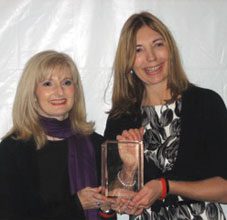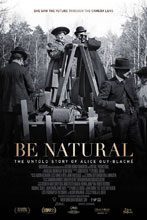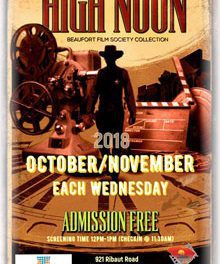
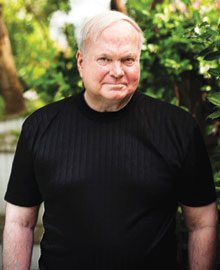 An encore presentation of a conversation with bestselling author Pat Conroy about his work from the page to the screen
An encore presentation of a conversation with bestselling author Pat Conroy about his work from the page to the screen
Story and Photos by Mark Shaffer
October 29th the ‘Pat Conroy at 70 Literary Festival’ kicks off with a special screening of The Great Santini at the USCB Center for the Arts. The film was a cinematic landmark for South Carolina: the first major motion picture to shoot in Beaufort, the first of several Conroy adaptations, and the movie that put the state – and the Lowcountry – on Hollywood’s hot sheet. I’m set to moderate a post-screening panel with the author and some of the film’s stars, including Michael O’Keefe and David Keith. (Keith was also in The Lords of Discipline.) This is familiar ground and territory I never tire of covering.
During the culmination of the 2010 Beaufort International Film Festival, Conroy received the Jean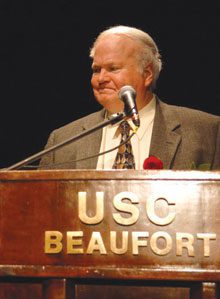 Ribaut Award for Writing Excellence, a hometown honor he says he was “sincerely thrilled” to receive. The night before, Pat and “Santini” cast mates Blythe Danner and Michael O’Keefe, attended a cocktail reception at Tidalholm, the historic house featured in the film and a stone’s throw from the house where Conroy penned the novel. Indeed, some of the key events Conroy fictionalized from his boyhood were filmed where they actually took place.
Ribaut Award for Writing Excellence, a hometown honor he says he was “sincerely thrilled” to receive. The night before, Pat and “Santini” cast mates Blythe Danner and Michael O’Keefe, attended a cocktail reception at Tidalholm, the historic house featured in the film and a stone’s throw from the house where Conroy penned the novel. Indeed, some of the key events Conroy fictionalized from his boyhood were filmed where they actually took place.
Our original plan was to slink away to a back room with Danner and O’Keefe and have a conversation “on location.” But famous authors and actors are much in demand at such affairs and Pat and Blythe were soon swept away in the crowd. O’Keefe and I did manage to sneak off long enough for a déjà vu laced chat about his Oscar-nominated experience on the film.
A few days later Pat called and we finally had the following conversation. I suspect some of the stories may be told again on the USCB stage only this time to a packed house. This is as it should be. Pat Conroy’s stories should always be told in front of an audience.
Mark Shaffer: “The Great Santini” was a life-changing event for a lot of people. What was it like to watch Michael O’Keefe breathe life into Ben Meechum?
Pat Conroy: He was a kid. It was amazing to watch. I was completely stunned. These people were great actors.
MS: [Michael] says there’s been a connection between the two of you from that first meeting in Charleston before filming began.
PC: No question. Also people tell me he looked kind of like me when I was in high 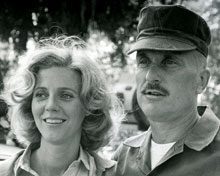 school. And Blythe Danner certainly had a resemblance to my mother.
school. And Blythe Danner certainly had a resemblance to my mother.
MS: Speaking of that, I really enjoyed your awards speech, particularly the part about your family’s reaction to their film selves.
PC: Oh, my God. I’m so full of B.S. I never know what I say anymore. I’ve got about four hours of crap I can get up and talk about. You never know what’s going to come out at any particular moment. Did I tell the story of the movie coming out in Beaufort?
MS: No.
PC: My family is sitting in the front row and the town of Beaufort is sitting behind them. (Laughs) Good God. And when Duvall beat up the whole family in the movie, the town of Beaufort is actually a bit disturbed that the real family is sitting there and they’re being torn apart by Robert Duvall on screen. There’s this shocked noise going through the audience, this whisper. And when it was over, when Duvall had beat up his family and stumbled out drunkenly into the night, my brother, Jim, leans down at the end of the aisle and says “Bambi. Duvall was Bambi compared to Dad. They should’ve let Dad show Duvall how to really tear up a family.” And of course, the Conroys – being us – screamed with laughter. Naturally the town thought we were more nuts than they must have thought we were before. That’s the favorite story about the family first seeing the movie.
MS: You once told me that they were all horrified at the idea of the film being made, but they all loved the film versions of themselves.
PC: Oh my God, they went crazy.
MS: Santini was the second book to make it to film. You’ve said it always freaks you out a little when Jon Voight introduces himself on screen as you in “Conrack” (the film version of The Water is Wide). I hadn’t heard that he wouldn’t talk to you on set.
PC: I did not realize until I read Christopher Dickey’s book “Summer of Deliverance: A Memoir of Father and Son” that James Dickey had practically driven Voight and Burt Reynolds nuts on the set of “Deliverance.” So I didn’t know what the reason was for about twenty years. He just didn’t seem interested in talking to me at all.
MS: He just associated you with your old professor – your mentor – and his tormentor.
PC: Yes. The one thing that I get to brag to my children about is that I got to meet Angelina Jolie who was six months old. And I tell my kids I whispered, ‘go into showbiz kid, you’ve got it.’
MS: The “Santini” set must have been quite a departure from the “Conrack” experience.
PC: It was wonderful. I got to watch my mother teaching Blythe Danner how to say the Rosary (laughs). Dad and Mom had not spoken since the divorce and there was tremendous tension when I brought Dad on because Mom had the movie crew thinking it would be like meeting Godzilla. And so when I first brought Dad on [set] people were reeling back in horror. Mom had done a great job. She won the PR battle on that particular front, hands down.
MS: But your dad was a pretty charming guy.
PC: And he became even more charming. And once again, after the movie and the book my father changed his entire personality. (Laughs) I didn’t even recognize him the last fifteen years of his life. I’d say “Dad, where was this great, great guy when I was growing up – this fabulous, wonderful, animated, witty guy that I missed for the first twenty-one years of my life?’ His answer was to say, “Son, you were too shallow to know the real father who was raising you.” Dad was very good, very good at that.
MS: Were you still living on The Point when they were shooting the movie?
PC: I was in Atlanta by that time. But it was amazing to watch this thing being filmed on The Point – to watch that amazing scene [between Duvall and O’Keefe] being filmed on the Green. So it all seems related. Having that party in Tidalholm was very moving to me.
MS: How did that feel? I got the sense from Michael that it was a little eerie, but in a good way.
PC: Well, it was very strange for me. You know I used to show people where the basketball court was. I’d drive up in the driveway and stop at the gate and show people where the basketball scene was filmed. This took place on my tour of Beaufort. And I remember I was sad when they took the basketball goal down, as if a part of my youth was somehow stolen in that very moment.
MS: I almost feel as though it should have been designated as some sort of historic landmark.
PC: And 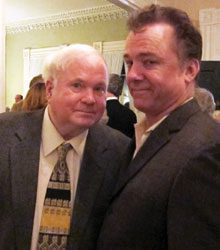 The Big Chill was made there, Forest Gump [was shot in Beaufort], and it’s funny how these movies have become part of my tour: showing people where Barbra Streisand stayed or where Nick Nolte stayed. Blythe Danner stayed in one of my favorite houses in Beaufort, near where I used to live on Hancock. It used to be called The Treehouse – very modest, but very beautiful. She told me the other night that that was one of the happiest times for her children in their lives, the making of The Great Santini.
The Big Chill was made there, Forest Gump [was shot in Beaufort], and it’s funny how these movies have become part of my tour: showing people where Barbra Streisand stayed or where Nick Nolte stayed. Blythe Danner stayed in one of my favorite houses in Beaufort, near where I used to live on Hancock. It used to be called The Treehouse – very modest, but very beautiful. She told me the other night that that was one of the happiest times for her children in their lives, the making of The Great Santini.
MS: [Danner’s daughter] Gwyneth Paltrow’s mentioned in interviews that her time in Beaufort was among the happiest of her childhood, running wild and barefoot through The Point.
PC: No kidding? That’s wonderful. You know, it was wonderful meeting her. She was a little girl then. Of course, I tell all my children that I told her ‘Make sure you get in the movies. You’ve got it, kid.’
(Laughter)
MS: Once again that proved prophetic. When I talked to Michael [O’Keefe], he mentioned that both you and your Dad were on the sidelines to watch them shoot the infamous basketball scene.
Pat Conroy: Yes, we were watching that. What a happy day that was.
MS: I imagine that was a little intense.
PC: Dad and I did not have a spectacular relationship at that time and did not realize that the movie was going to help bring us together – he was so enraged by the book. Even [about the scene] in the book he said “I never would have hit you in the head. I’d have knocked your f*****g head off with one blow from a basketball. You’d have been unconscious if I’d done that.” And I said, “Yeah, Dad, but I had to tone it down so human beings could believe it might actually happen.” We had a million scenes like that. Dad was a nightmare to play basketball 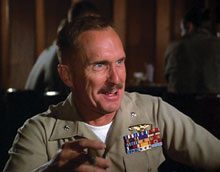 against. So what he would do to me, he’d simply slap my face. He would guard me, so first basket [I make] he simply slaps my face. He’d slap me and he’d slap me and he’d slap me. And I’m tired and trying to get away from him and he still slaps me – slaps me on the back of the head. I was looking for a way to convey that in a dramatic fashion, so I came up with that bouncing the basketball off the head. Blythe told me Duvall almost killed her by throwing the ball into her stomach. You can see it in the film – you can see it hurt her.
against. So what he would do to me, he’d simply slap my face. He would guard me, so first basket [I make] he simply slaps my face. He’d slap me and he’d slap me and he’d slap me. And I’m tired and trying to get away from him and he still slaps me – slaps me on the back of the head. I was looking for a way to convey that in a dramatic fashion, so I came up with that bouncing the basketball off the head. Blythe told me Duvall almost killed her by throwing the ball into her stomach. You can see it in the film – you can see it hurt her.
MS: You’re right. O’Keefe, who took those basketballs to the head, says Duvall did not hold back, did not pull his punches.
PC: Is that right? Holy crap. Poor Blythe. Some poor woman who had just moved to the Point came up and watched [the filming] with my father and me – and it was a horrible scene to watch being filmed. That’s when I realized that Duvall and Blythe and Michael – these were great actors. I thought, Jesus Christ, these people are terrific.
So this poor little lady is watching this and she comes over and sees my father and says (affecting shocked woman), “Did you play these games often, Colonel?”
(Both laugh)
And he says, (deep and serious) “Every day, madam! Every damn day of my son’s life!” (More laughs)
And so she just stares at him in horror and Dad looks at me and says, “I like that scene.” And I said, “Dad, only you would.”
MS: He was fond of pointing out that he was responsible for Duvall’s career, which really took off after “Santini.”
PC: Oh, my God! I want to tell you, let me not de-emphasize that. Dad was not exactly a movie buff. I don’t think he even knew what “The Godfather” was. He did afterwards, he became an aficionado of Robert Duvall’s career. And he gave himself full credit for Duvall’s [Best Actor] Oscar in “Tender Mercies.” Dad always said that wasn’t half the role he had in “Santini.”
MS: Duvall showed up in Beaufort fresh from the epic nightmare of shooting Francis Ford Coppola’s “Apocalypse Now.” In a way he was already geared up for the character of Bull.
PC: Dad didn’t know “the smell of napalm in the morning” from nothing, but [Duvall] was ready for [Bull].
MS: Did he maintain that intensity off the set?
PC: He was very nice to me off the set.
MS: You’ve got a core group of very close old friends – a number of them were at that [Tidalholm] party. This has to be a remarkable journey for friends and family over the years.
PC: Well, I think it is. It may be painful for some. My sister Kathy was [at the BIFF awards ceremony] and she had a spectacular time. She simply went nuts when Blythe Danner talked about my mother with such fondness. She said it was one of the great nights. For me it was sort of surreal. I don’t know quite what to feel, just like I don’t know what to feel when I see a movie made out of one of my books. I don’t even know what to feel when I see a book made out of a book.
MS: It all still seems extraordinary?
PC: It does just seem extraordinary to me, unreal to me. It was a dream I had in Beaufort High School and I can’t believe it worked!
MS: In your speech you explained that in a way you feel as though you’re still fifteen years old.
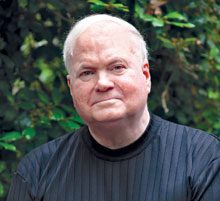 PC: There’s no question about that. Here’s how weird my association with Beaufort is: it thrilled me to get the Jean Ribaut Writing Award. One of the reasons it thrilled me is my mother wanted me to try out for a play that was produced in Beaufort when we [arrived]. And I was not even allowed to try out for some reason. It was about the founding of Beaufort and it told the story of Jean Ribaut founding the colony – he was the first [European] to land in Beaufort County. But it tickled me and I called Julie Zachowski, who used to be the librarian and was my classmate in high school. And I said, “Julie, you were in that play.” And she said, “I was an usher.” My best friend was in the play and he lorded it over me because he was in it and I wasn’t. He had a line and I was so jealous I could barely stand it. I said, “Julie, what was the line?” And she said, “Allo! The admiral comes.” (Both laugh) So that’s the association [with Beaufort] that I love.
PC: There’s no question about that. Here’s how weird my association with Beaufort is: it thrilled me to get the Jean Ribaut Writing Award. One of the reasons it thrilled me is my mother wanted me to try out for a play that was produced in Beaufort when we [arrived]. And I was not even allowed to try out for some reason. It was about the founding of Beaufort and it told the story of Jean Ribaut founding the colony – he was the first [European] to land in Beaufort County. But it tickled me and I called Julie Zachowski, who used to be the librarian and was my classmate in high school. And I said, “Julie, you were in that play.” And she said, “I was an usher.” My best friend was in the play and he lorded it over me because he was in it and I wasn’t. He had a line and I was so jealous I could barely stand it. I said, “Julie, what was the line?” And she said, “Allo! The admiral comes.” (Both laugh) So that’s the association [with Beaufort] that I love.
MS: Throughout your work there has indeed been a very strong association with Beaufort. It’s obviously a very, very special place. You get it and that seems to factor into just about everything you do. [Charleston novelist] Josephine Humphries once told me that in Southern literature place is as much a character as anything else.
PC: It certainly is with me. I have to tell you, when I came here no one told me how beautiful Beaufort was. To Dad it was a base he got to fly out of. Mom had never heard of it. So we come into this town and I can remember my first time riding down Bay Street and the mansions and thinking, “My God!” I look out to this river and I’ve never seen anything so pretty in my life. In landscape Beaufort County simply entered my life from the time I got here until now. It just seems prettier than any other place to me and I love writing about it. And, by the way, I lived in the eastern Siberia of “teenagerhood” in Beaufort – I lived in Laurel Bay.
MS: That’s a bit of a haul, particularly for a kid without a car in those days.
PC: My God! I can tell you how much of a haul it is. I’ve been back in Beaufort since 1991and I have never – not one single time – even seen the gates of Laurel Bay. I just have no reason to go there.
MS: Back on the subject of your work, any possibility that more of it will make it to the movies?
PC: Yeah. Allan Ladd, Jr. bought “Beach Music.” He’s had that. And somebody’s talking about “South of Broad” now. I usually don’t have anything to do with that. They just tell me about the negotiations. “My Losing Season” was bought by Brad Pitt – he owns that one. And of course when my daughters – my rude, poorly raised daughters – found out that Brad Pitt might play my part, they sank to their knees in helpless laughter.
MS:(Laughing)
PC: So I cut them out of my will.
MS: (Still laughing)
PC: They scream with laughter every time the thought crosses their minds. But I think Brad’s let himself get a little too old for the role.
MS: That should be a hot property. That sort of lesson-learned sports genre is big now with the success of “The Blind Side.”
PC: I didn’t see it. I read the book. It was terrific.
MS: Another one that got away, another big hit shot next door in Georgia.
PC: South Carolina has to change the rules. If they can get a movie made in this location it is going to bring benefits for the next hundred years to Beaufort. Something’s got to be done. They’ve got to make it easier, they’ve got to make it less expensive for these films to come here.
MS: The powers that be in Columbia can’t seem to process that. Which means the odds that any of these projects of yours would film in this state are slim to none. How does that make you feel?
PC: It wouldn’t be a movie made from my book, I can tell you that. It just wouldn’t be. Nothing any of these legislators can do will have as lasting an impact on tourism, on business – on anything else – as getting a movie made in South Carolina.
Email Mark Shaffer at backyardtourist@gmail.com

